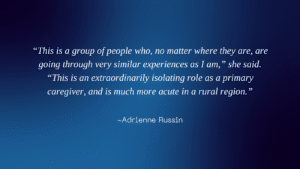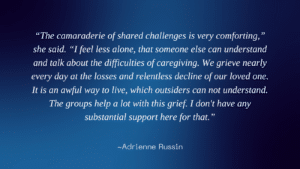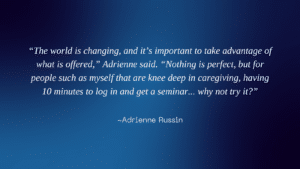By Meghan McCarthy
Editor’s Note: In light of the 2024 PennAITech Symposium, this article is a part of ongoing coverage on the intersection of technology and dementia.
When Adrienne Russin’s husband began showing signs of dementia, she was at a loss. Living in a rural area of central Pennsylvania, Adrienne didn’t have access to resources to support her husband or herself.
Unaware of the Penn Memory Center (PMC) or similar institutions, the family struggled without adequate support as his condition worsened six years ago.
“Roughly 20 years ago, I was the primary caregiver for my mother, who had end-stage cancer in the Philadelphia region,” Adrienne said. “She received wonderful, absolutely brilliant care. Fast forward to our experience in central Pennsylvania, and it’s disheartening to see the stark contrast in support, research, and treatments for different illnesses.”
After her husband was formally diagnosed with frontotemporal dementia (FTD), Adrienne took it upon herself to research resources.
She then found the world of virtual caregiver support groups.
Now, she belongs to seven.
Virtual caregiver support groups are offered on virtual platforms to provide community, information, and counsel to participants. While they have existed long before 2020, the COVID-19 pandemic heavily increased virtual programming options. At PMC, a monthly virtual caregiver support group is offered.
Groups can be open to the public or semiprivate.
“This is a group of people who, no matter where they are, are going through very similar experiences as I am,” she said. “This is an extraordinarily isolating role as a primary caregiver, and is much more acute in a rural region.”
While each group has a different format, most involve each participant having a period of time to share about their experiences. Some are focused on specific themes, such as grief, and others invite guest speakers. Most are facilitated by field experts such as social workers.
Despite the differing structures, all groups emphasize respect, non-judgment, and confidentiality.
The seven groups that Adriene belongs to range in meeting frequency and in overall tone. While some are run from groups in this region, others are offered through west coast and midwest programs.
Practical topics range from bathing and diapering to discussions on the financial aspects of caregiving.
The insights that Adrienne gained have been invaluable, helping her improve her caregiving skills and understanding. Her detailed notes from each session have accumulated into a journal exceeding 200 pages, a testament to the profound impact these groups have had on her life.
“Sharing information and experiences is vital with the groups,” Adrienne said. “The meetings also provide some measure of stability and community. Despite the challenges, the feedback and problem-solving discussions are incredibly helpful.”
For Adrienne, living in a rural Pennsylvania means a lack of local community. These virtual groups offer a sense of belonging and understanding that is hard to find elsewhere. The connections made extend beyond the digital realm, leading to real-life friendships and support networks.
“I’ve met a few people that are so funny, and I wouldn’t have met them any other way,” she said. “We get together for lunch and just chat and laugh. It doesn’t always have to be about illness, often we just chat about life.”
It’s not always easy to be vulnerable, regardless of the format. Being experienced with these groups, Adrienne doesn’t shy away from being honest.
In addition to practical topics, Adrienne finds the forums provide an opportunity to process grief and loss.
“The camaraderie of shared challenges is very comforting,” she said. “I feel less alone, that someone else can understand and talk about the difficulties of caregiving. We grieve nearly every day at the losses and relentless decline of our loved one. It is an awful way to live, which outsiders cannot understand. The groups help a lot with this grief. I don’t have any substantial support here for that.”
As with all things, Adrienne has also experienced downsides to her virtual groups.
Emotionally, it can be difficult to hear the way others handle care for loved ones with dementia. For example, Adrienne finds a few individuals in each group who are afraid to share a dementia diagnosis with others.
At other times, when hearing about caregiver stories, Adrienne worries about burnout. It can be hard to not feel emotionally tied.
Beyond emotions, virtual programming requires a certain level of digital literacy and access to technology. Most of Adrienne’s meetings run through Zoom, an application she finds user-friendly. Practically speaking, the presence of experienced facilitators makes a big difference in the tone of the group.
Despite the challenges, Adrienne is a proponent of these virtual resources.
“The world is changing, and it’s important to take advantage of what is offered,” Adrienne said. “Nothing is perfect, but for people such as myself that are knee deep in caregiving, having 10 minutes to log in and get a seminar… why not try it?”


